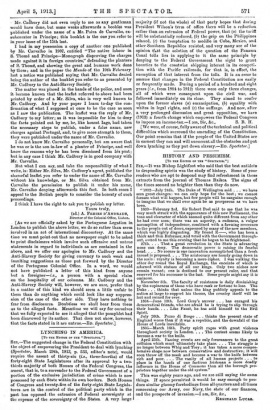HISTORY AND PESSIMISM. [To THE EDITOR OF THE "SFECTATOR.”1 Sin,—It
was Bishop Lightfoot who said that the best antidote to desponding spirits was the study of history. Some of your readers who are apt to despond may find refreshment in these extracts from the journal of Thomas Raikes. The signs of the times seemed no brighter then than they do now.
"1832—July 24th. The Duke of Wellington said . . . we have seen great changes : we can only hope for the best ; we cannot foresee what will happen, but few people will be sanguine enough to imagine that we shall ever again be as prosperous as we have been.
1833—February 3rd. Sir Robert Peel said to me that he was very much struck with the appearance of this new Parliament, the tone and character of which seemed quite different from any other he had ever seen; there was an asperity, a rudeness, a vulgar assumption of independence, combined with a fawning reverence to the people out of doors, expressed by many of the new members, which was highly disgusting. My friend R—, who has been a thick and thin Reformer, and voted with the Government through- out, owned to me this evening that he began to be frightened.
27th. . . . That a great revolution in the State is advancing none can deny. The democratic power is raising its fearful head. . . No sooner is one innovation accomplished than a fresh inroad is proposed. . . . The aristocracy are hourly going down in the scale : royalty is becoming a mere cipher. I was walking the other day round the Royal Exchange, the enceinte of which is adorned with statues of all our kings. Only two niches now remain vacant; one is destined to our present ruler, and that reserved for his successor is the last. Some people might say it is ominous.
November 5th. The faculty of resistance is daily diminishing by the supineness of those who have rank or fortune to lose. The Duke . . . thinks that unless the king publicly appeals to the nation at largo to support his throne, the country itself will be lost and ruined for ever.
1834—June 12th. Lord Grey's answer . . . has enraged his democratical friends, who are afraid he is trying to slip through their hands.. . . Like Faust, he has sold himself to the Evil Spirit.
July 26th. Pozzo di Borgo . . . thinks the present state of England worse than if it was a republic, and the downfall of the House of Lords inevitable.
1835—March 16th. Party spirit rages with great violence throughout society in London. • . . The contest seems likely to become a war to the knife.
April 25th. Passing events are only forerunners to the great collision which must ultimately take place. . . . The struggle is no longer between Whig and Tory ; it has taken a more compre- hensive shape now between conservative and destructive; it will soon throw off the mask and become a war to the knife between rich and poor. . . . The vanity of all human projects . . . to place in the hands of one factious Irishman a more deadly influence in the House of Commons than all the borough pro- prietors together under the old system."
This was eighty years ago, and we are still saying the same things. If space permitted it would be easy enough to pro- duce similar gloomy forebodings from all quarters and all times concerning our Army, our Navy, the state of our finances, and the prospects of invasion.—I am, Sir, &c., R EGIN ILD LUCAS.














































 Previous page
Previous page